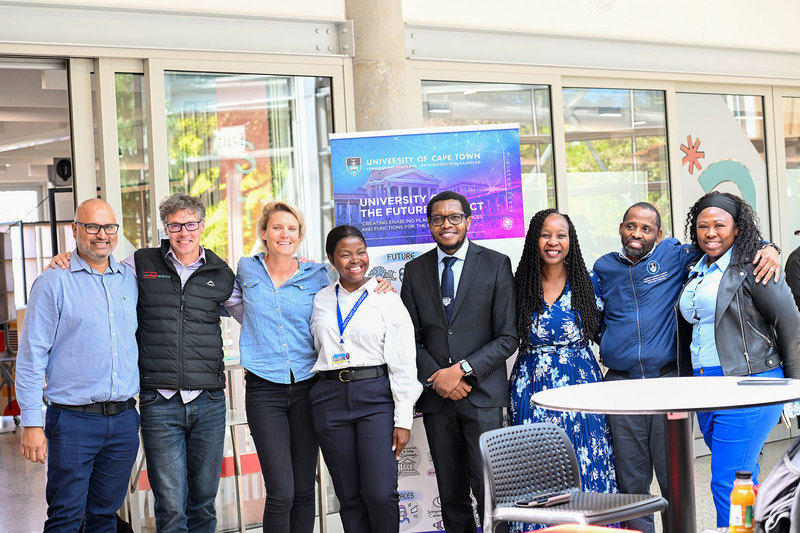Future-proofing UCT
16 October 2024 | Story Niémah Davids. Photos Lerato Maduna. Voice Cwenga Koyana. Read time 5 min.
Staff and students at the University of Cape Town (UCT) have spoken: a people-centred university is what they want, and those at the forefront of the University of the Future (UoF) project are leading the way to ensure it becomes a reality.
UCT is in the process of undergoing a transformative shift with the visionary UoF project, and it’s not just a physical makeover, but a conceptual shift too. The initiative aims to create a vibrant and modern campus, designed to attract talent, foster community engagement and support UCT’s vision to unleash human potential to create a fair and just society.
“We decided to engage with the UCT community on what the future could possibly look like and the themes that came up had a lot to do with belonging and inclusivity. UCT has been voted one of the most beautiful campuses in the world. So, we’re not starting from a place where we’re looking at how we make UCT more beautiful. A lot of the conversations we had were around how … we [can] make it more inclusive and how we [can] create a sense of belonging,” said Professor Salome Maswime, the chair of the UoF Steering Committee.
During a UoF pre-exhibition gathering on Monday, 14 October, delegates from across the campus community, including Vice-Chancellor Professor Mosa Moshabela converged on the Hasso Plattner School of Design Thinking Afrika (d-school Afrika) for a project status update, some reflections, and an opportunity to hear colleagues present on different, state-of-the-art projects that form part of the initiative.
A snapshot of UoF
As she delivered a brief status update, Professor Maswime asked: What is the university of the future? She reminded the audience that achieving it is a multiple layer process and requires that the university becomes:
- deeply engaged with society
- engaged actively to bring about a better world
- filled with rapidly advancing technology
- dedicated to research that will solve the world’s most pressing problems
- committed to educating students on global citizenship and sustainable thinking
- deeply connected to the industries and communities in its surroundings
- committed to serving the needs of students.
Key themes
Having engaged with the campus community in recent months to understand their needs and what’s most important, Maswime said the committee has established four themes that underpin their feedback.
- The academic project – focus on the role and impact the university has on society; foster social engagements with government, industries and communities; decolonise the curriculum; develop an environment that focuses on lifelong learning.
- The future campus – what does a campus of the future look like? A technology-driven space that offers training facilities, entertainment, food and dining, decolonised spaces and safety should be a priority. Further, the infrastructure and services should support the design and delivery of the academic project.
- The campus experience – recognising diversity and the melting pot of cultures, religions and ethnicities, safety and security and maintaining deep connections with alumni.
- Leadership and governance – to execute the UoF project successfully, leaders must be people-centred and support innovation. UCT should create a home for future thinking, leaders must be transparent and accountable and have values and integrity and develop adaptive systems over bureaucratic systems.
Opportunity to dream
For Professor Moshabela, the UoF project presents an opportunity to dream, imagine and reimage what the future will look like for UCT.
“I’m hoping that we can use the insights that you have [gathered] to integrate them into the thinking that we’re having and the work underway.”
He congratulated the steering committee and other members of the campus community who have been involved in the initiative for gathering valuable data and facilitating important conversations on transformation, inclusivity and fostering a sense of belonging on campus.
He urged the audience to keep in mind that the decisions they make to future-proof the university will impact current members of the community, as well as those who will be part of UCT in decades to come. He discouraged complacency and encouraged a mindset where everyone strives to do and be better than the previous day – for the benefit of the institution.
“We have to strive to be better than ourselves. I’m hoping that we can use the insights that you have [gathered] to integrate them into the thinking that we’re having and the work under way, to try and build a holistic picture … to move the institution forward,” he said.
Part of the programme included presentations by various members of the campus community, including the Children’s Institute on how to make campus a more inclusive, accessible space.
 This work is licensed under a Creative Commons Attribution-NoDerivatives 4.0 International License.
This work is licensed under a Creative Commons Attribution-NoDerivatives 4.0 International License.
Please view the republishing articles page for more information.
Listen to the news
The stories in this selection include an audio recording for your listening convenience.



















































































































































































































































































































































































































